What’s Happening at CRN?
Get the latest CRN news on our monthly newsletter page!
Episode 15: April 2024
Network-Wide CRN User News
New Functionality in CRN for Screeners and Assessments!
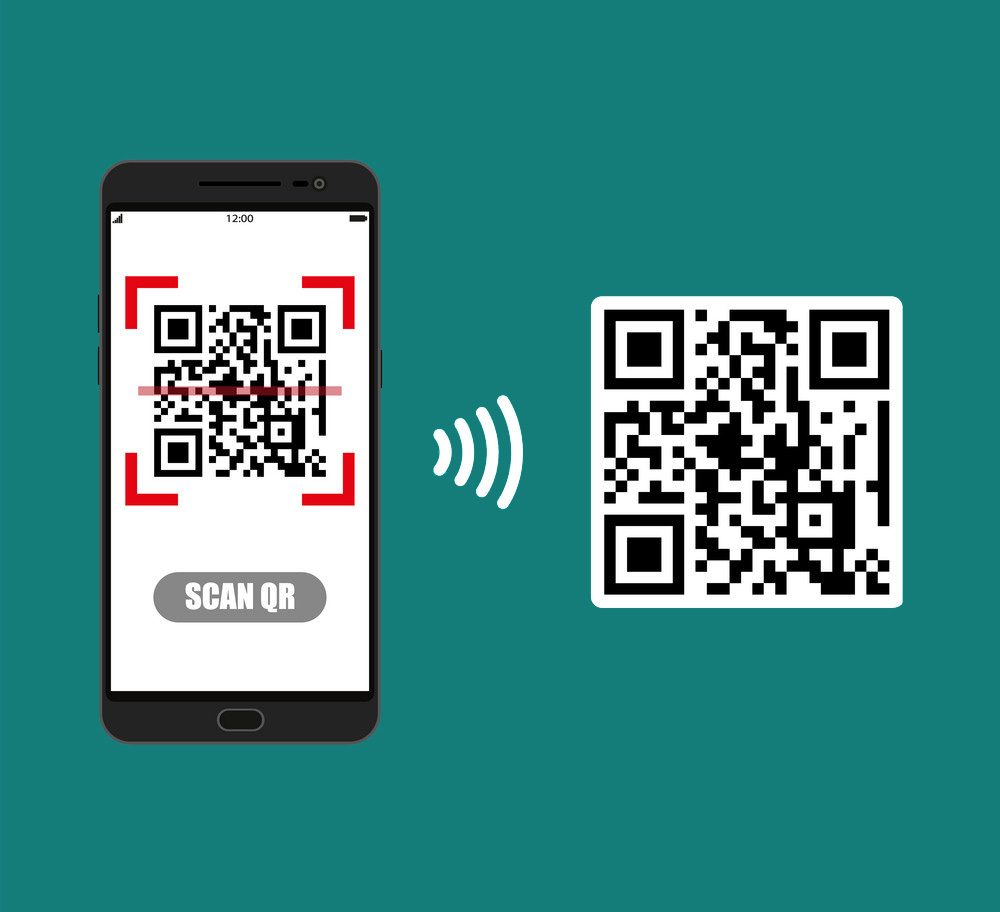 You can now send screens and assessments directly to your clients/ patients via text or email from CRN! This new functionality is a great way to have a screener or assessment filled out prior to meeting with your clients/patients.
You can now send screens and assessments directly to your clients/ patients via text or email from CRN! This new functionality is a great way to have a screener or assessment filled out prior to meeting with your clients/patients.
Do you use a tablet to administer screeners? A QR code is now available as well. Just bring up the screener in CRN, scan the QR code, and hand the tablet to the individual.
Both methods allow you to capture the information digitally, which saves time for CRN users.
No more manual entry from paper!
Currently, both functionalities are available for the following screeners/assessments:
- Adverse Childhood Experience Questionnaire for Adults (ACE)
- Annual Questionnaire
- Edinburgh Postnatal Depression Screener
- GAD-7
- Pediatric SDoH Screener
- PHQ-9
- PRAPARE
Not seeing the screener your agency uses? Do you have a screener/assessment specific to your organization? QHN can create custom screeners and assessments with the new functionality.
For more information or questions, contact Jeff Stoddart.
Healthier Together Summit
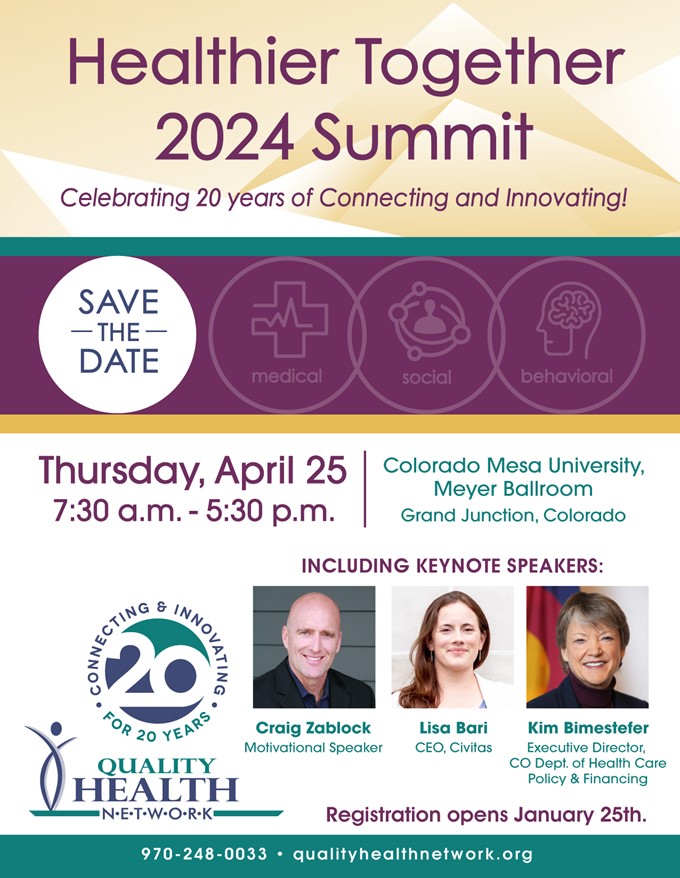 Join us for a day of fantastic speakers and connecting for better health.
Join us for a day of fantastic speakers and connecting for better health.
In 2024, QHN will celebrate 20 years of community collaboration by connecting and innovating healthcare, behavioral, and social organizations to provide crucial information that ensures people get the care and services they need quickly and efficiently.
We are looking forward to reuniting to ignite creativity and exploration, foster lively discussions that advance healthcare and address the social determinants of health, and share some laughter and successes.
We will hear from industry leaders like Kim Bimestefer (HCPF) and Lisa Bari (Civitas), as well as Craig Zablocki, who will guide us through what it means to transform through vulnerability and authenticity. There will also be a robust resource fair – an opportunity for you to highlight your good work and see the incredible resources that are offered in western Colorado – along with several thought-provoking Hot Topics sessions.
Scholarships and complimentary tickets are available for CRN Network Partners and other non-profit organizations. You will also have the opportunity to bring a booth to the Summit’s resource fair.
Contact Charity for more info: cmeinhart@qualityhealthnetwork.org
New 2024 Training Schedule Released
Utilization
Network-Wide Utilization Stats
(to see region-specific numbers, scroll to the bottom)

Regional News
West Mountain News
Welcome Our New CRN Partners in West Mountain!
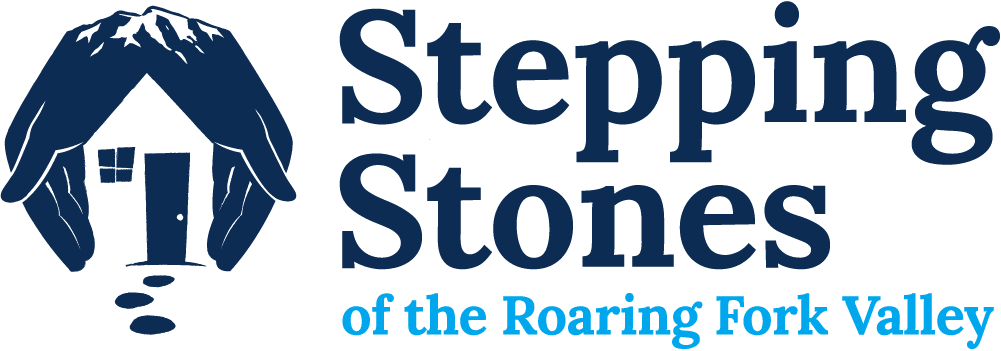
Stepping Stones of the Roaring Fork Valley
We deliver comprehensive, relationally-centered services that build protective factors and mediate risk factors through our Youth Program (ages 10-14) and Young Adult Program (ages 15-24). Our holistic program model includes: mentoring and case management, safe space, basic needs services, mental health services, educational support, skill development and community connections
Regions Served: West Mountain
CRN Usage: Receives email referrals from CRN
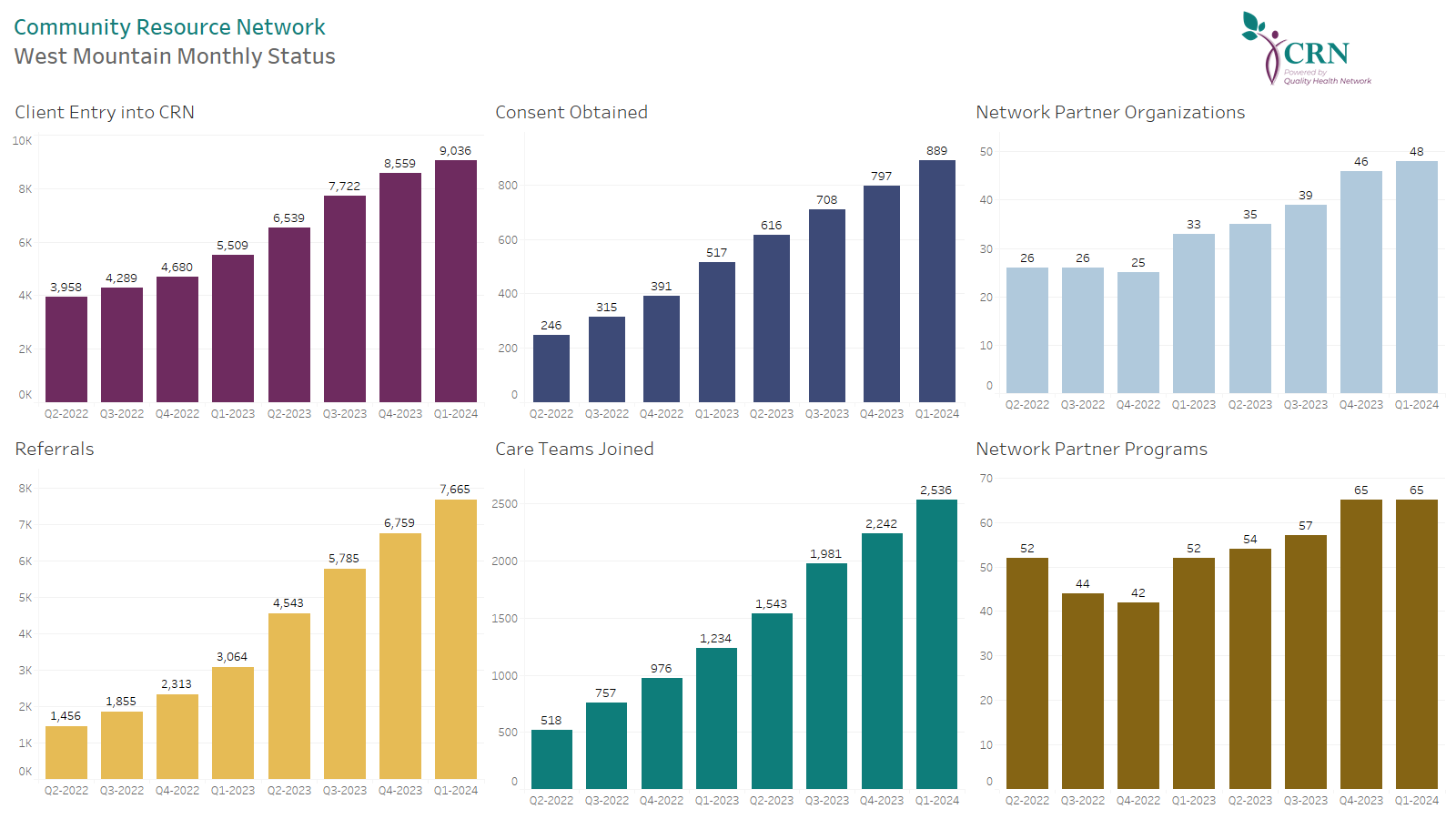
Mesa County News
Welcome Our New CRN Partners in Mesa County!

Foster Alumni Mentors
Foster Alumni Mentors (FAM) serves any individual (16 years old and up) who has experienced foster care particularly those who have aged out of the foster care system, those who are currently struggling to meet their basic needs, and /or those who are seeking opportunities to stabilize and improve their lives. We offer many programs to support, prepare and build confidence for foster alumni (Members) as they transition into adulthood and beyond. Some of these include; monthly peer to peer mentoring events, Quarterly informational workshops, Teen group, Mom’s Group, education assistance and housing support.
Region Served: Mesa County
CRN Usage: Receives email referrals from CRN
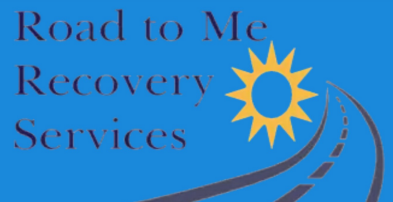
Road to Me Recovery
Road to Recovery’s mission is to provide innovative therapies and treatments to allow each patient to detoxify from substance use, address underlying issues, control pain, and reduce mental health symptoms so that they can recover to enjoy a healthy and manageable happy life. We want to help individuals thrive. At each location therapists, specialists and doctors will work with individuals to help find the most direct route to wellness.
Road to Me Recovery has been engaged with neighboring as well as government agencies since 2013, working to expand and improve access to equitable care in providing a continuum of treatment services. As part of that effort, Road to Me Recovery seeks partnership with well-coordinated community systems including BHA, in efforts to continue to increase access to integrated, seamless, culturally competent, standardized in terms of multi-disciplinary assessment, outcome driven, cost effective, and collaborative care.
Road to Me Recovery is licensed to provide a broad continuum of care including outpatient substance use treatment services/ and mental health treatment for adults and some appropriate youth who meet respective Levels of Care (LOC) criteria. Service elements may include case management, crisis stabilization, medication/ withdrawal management, individual and group therapy, trauma specific therapies, innovative treatments treatment resistant / and or chronic conditions, coordination of care and transitional services.
Regions Served: State of Colorado
CRN Usage: Receiving Referrals, Sending Referrals, Joining Care Team
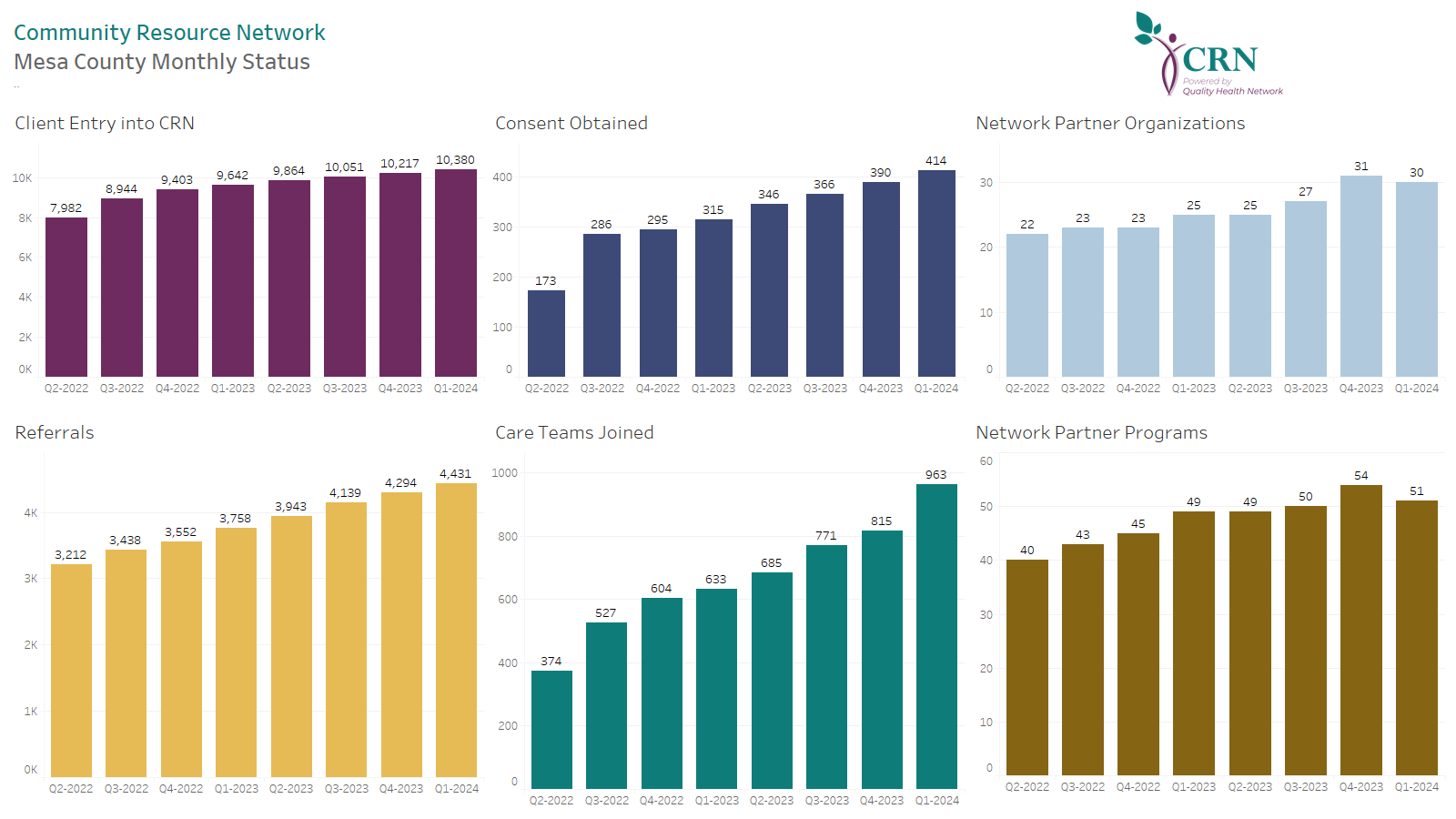
Delta/ Montrose/ Gunnison News
Welcome Our New CRN Partners in Montrose/Delta/Gunnison!

Telluride Whole Health
We provide affordable direct primary care and functional medicine. Direct primary care (DPC) is a membership-based model with a low-cost monthly fee. The purpose of DPC is to bring the patient back to the center of care and bring price transparency back into medicine. Some people compare it to a blend between Netflix and Costco for medicine. Similar to unlimited movies on Netflix, patients pay a low monthly fee but have unlimited visits with the provider. Similar to the cost savings with Costco, patients receive discounted medications, labs, and supplements.
Regions Served: Montrose
CRN Usage: Sending Referrals and Joining Care Teams

HeartLight Center
We provide grief support to adults through grief support groups and workshops. Our groups are offered both in-person at our different locations, as well as virtually. Most groups are open, monthly groups, but we also offer special closed and curriculum-based groups, and most groups are donation-based. We also provide educational presentations to community, organizations, and businesses on various grief topics. Prefer clients contact directly via email or via the website.
Regions Served: Delta/Montrose, Mesa County
CRN Usage: Received email referrals from CRN
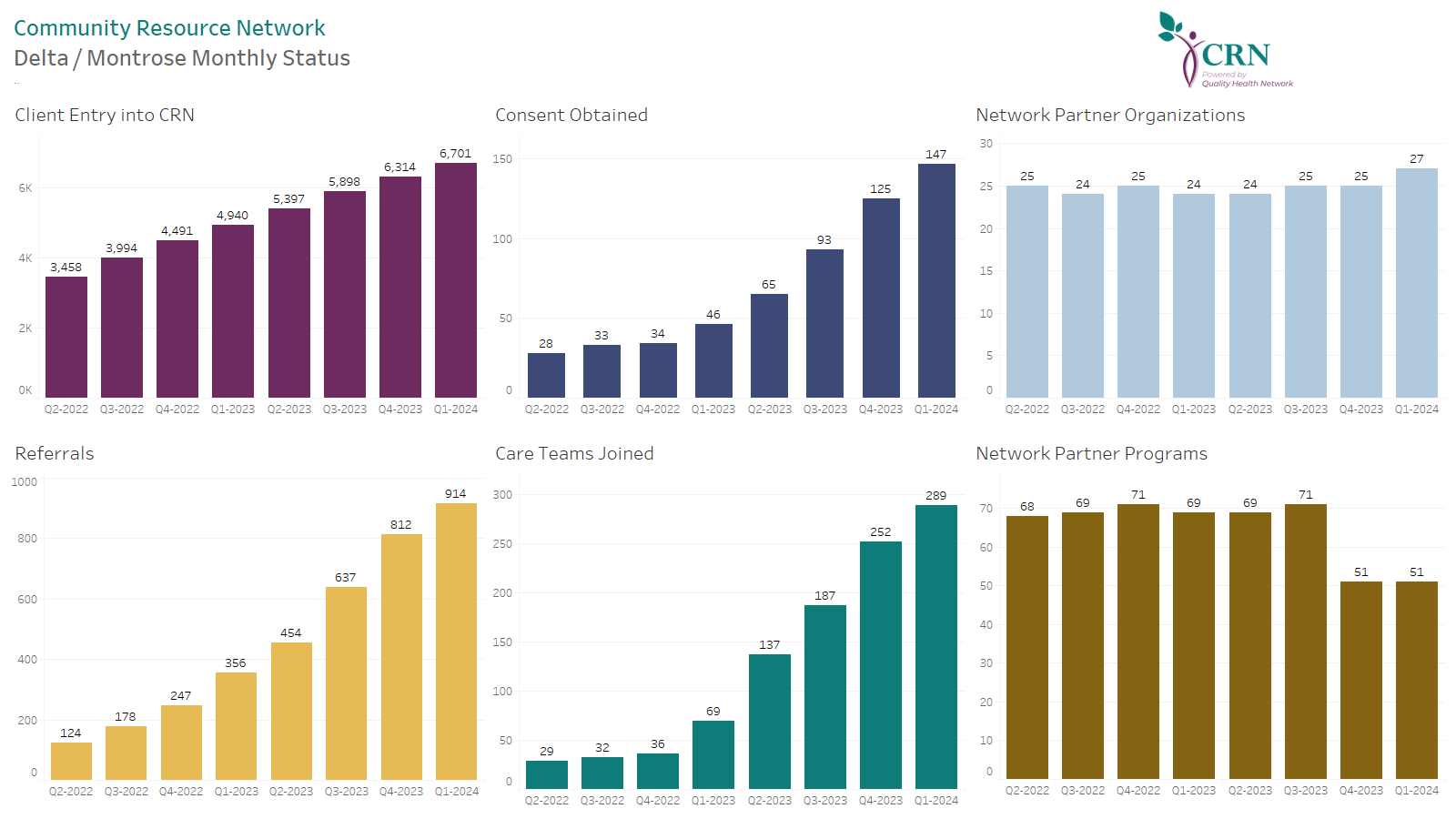
Helpful Resources for April 2024
from the Colorado Regional Health Connector Program
Funding Opportunities –
- Funding (due 4/15) – First Responders Comprehensive Addiction and Recovery Act Grants. Funding to support first responders and members of other key community sectors on training, administering, and distributing naloxone and other Food and Drug Administration (FDA)-approved overdose reversal medications or devices. Funding is set aside for recipients serving rural communities.
- Funding (due 4/17) – Drug-Free Communities Support Program. Awards funding to coalitions working to reduce substance abuse among youth and to establish and strengthen collaboration among communities, organizations, and governmental entities.
- Funding (due 4/24) – Vaping Prevention. Provides funding to education providers serving grades K-12 to address the immediate and long-lasting health implications of vaping and the use of ENDS (Electronic Nicotine Delivery Systems) by youth.
- Funding (due 4/29) – Building Communities of Recovery. The Substance Abuse and Mental Health Services Administration and the U.S. The Department of Health and Human Services is providing grants to mobilize and connect community-based resources to increase the availability and quality of long-term recovery support for people with substance use disorders and co-occurring mental disorders.
- Funding (due 4/29) – Distance Learning and Telemedicine Program Grants. This program provides grants to encourage and improve telemedicine and distance learning services in rural areas through the use of tele communications, computer networks, and related advanced technologies.
- Funding (due 4/30) – School Based Mental Health Services Grant Program. Grants to increase the number of qualified mental health service professionals providing school based mental health services to students in local educational agencies with a demonstrated need.
- Funding (due 5/6) – Rural Communities Opioid Response Program. This program provides funding to improve access to integrated in coordinated treatment and recovery services for substance use disorders for people living in rural areas. The purpose of this program is to address the negative outcomes of substance use disorders and opioid use disorder in rural communities and promote long-term, sustained recovery.
- Funding (due 5/14)- AI/AN Head Start Expansion. The Administration for Children and Families, and the U.S Department of Health and Human Services is providing funding to operate Head Start or Early Head Start programming in American Indian and Alaska Native communities.
- Funding (due 5/14)- Head Start Expansion and Early Head Start Child Care Partnership Grants. This program offers grants to operate Head Start and Early Head Start programming within a community, leveraging existing local resources to provide a comprehensive array of health, mental health, nutritions and social services for children and their families.
- Funding (due 5/14)- Migrant and Seasonal Head Start Expansion. This program is offering funding to operate Head Start and Early Head Start programming for migrant and seasonal families.
- Funding (due 5/14) – Farmers Market Promotion Program. This program offers grants to projects that assist in the development, coordination, and expansion of domestic farmers markets, roadside stands, community-supported agriculture programs, agritourism activities, and other direct producer to consumer market opportunities.
- Funding (due 5/15) – Community Level Innovations for Improving Health Outcomes. Grants for projects that demonstrate community level innovations to increase use of preventive health services, improve health outcomes, and reduce health disparities driven by social determinants of health.
- Funding (due 5/21) – Promoting Access to Crisis Teams. Grants to create or expand crisis intervention teams and to embed mental and behavioral health services with law enforcement agencies so they can better respond to individuals in crisis in the community. Small, rural, and tribal agencies are encouraged to apply.
- Funding (due 5/21) – Rural Development Broadband ReConnect Program. Loans, grants, and loan/grant combinations to expand broadband service to rural areas without sufficient broadband access.
- Funding (due 5/21)– Mentoring for Youth Affected by Opioid and Other Substance Misuse. Grants to support local, regional, or statewide efforts to provide mentoring services to youth ages 17 and under and their families impacted by opioids and other substance misuse. Rural communities and federally recognized tribes are priority populations.
- Funding (due 6/3) – Culture of Health Prize. The Robert Wood Johnson Foundation is giving awards to honor collaborative, community-based efforts that address systemic barriers to health and well-being and help communities achieve health equity and create a culture of health for all community members. Up to 10 communities will each receive a $250,000 award, additional benefits are described on the program website.
Webinars, Trainings & Conferences
- Virtual: CU School of Medicine’s Rural Program Presentation– April 16, 12-1pm. Drs Megan Lykke and Mark Deutchman from the DFM’s Rural Program will be hosting presentations and talking about engaging and recruiting medical students from small universities.
- Virtual: Health Equity LGBTQ+ Online Course – Live sessions start Tuesday, April 16, 2-3:30 PM with 6 weekly virtual sessions. Ideal for public health professionals who want to learn more about the health of the LGBTQ+ community, increase their understanding of the health disparities faced by LGBTQ+ individuals, and learn how to address bias in the delivery of public health services to LGBTQ+ communities.
- Virtual: Strategic Prevention Framework Application for Prevention Success Training (SAPST) – Live sessions start Tuesday, April 30, 10 AM – 12 PM with 4 weekly sessions. Describe risk and protective factors in multiple contexts. Participants will be able to summarize the Strategic Prevention Framework; describe how to assess substance use problems, risk and protective factors, and community capacity; describe criteria to select a problem, risk or protective factor, and intervention; apply the 5 basic steps of a logic model; and explain different uses of evaluation results.
- Virtual: Public Health Emergency Unwind – Wednesday, April 24, 1-2pm MT. The Department of Health Care Policy & Financing (HCPF) will provide communication resources for partners to assist Health First Colorado and/or CHP+ members in preparing for and taking part in the renewal process, a deeper dive on the unwind data, and discuss transitions in coverage for members who may no longer qualify for state-administered programs. This webinar is geared toward partners such as advocacy organizations, providers, and community organizations who support Health First Colorado or CHP+ members.
- In-person: Community Capacity Building Workshops – click to see specific dates/times/locations throughout CO in April and May. Telligen will provide an opportunity for structured, facilitated collaboration between hospitals and community partners to design strategies to support current HTP efforts and beyond by building community capacity and understanding “Power With.” Exploring opportunities and approaches to collectively address challenges facing your community, and share best practices. Intended audience includes Hospital HTP and Community Engagement teams, quality directors, community partners, Regional Accountable Entity (RAE) community engagement staff, Regional Health Connectors, those leading community coalitions, collaboratives, and health alliances, and Neighborhood Engagement (CHNE) leads.
- In-person Conference: Yampa Valley Wellness Conference – Thursday, May 9, 8am-6pm. Since 2011, the Yampa Valley Wellness conference has drawn participants from professional backgrounds such as behavioral health and associated disciplines, non-profit organizations, education, and business, as well as interested community members in Routt County and beyond. During presentations, experts share cutting edge information, methods, and tools to support the work and lives of participants. Limited scholarships available.
- In-person and Virtual: HTP Learning Symposium- Tue/Wed, June 4-5. This symposium is about sharing experiences, inspiring innovative thinking, and planting seeds for growth. Participants will be provided with tools and learning experiences for future success under the Hospital Transformation Program (HTP). Presenters at the symposium will represent both urban and rural hospitals, national equity leaders and numerous HTP collaborators.
- Virtual and In-Person: HCPF Hospital Transformation Program Learning Symposium – Tue/Wed, June 4-5, 8am-4:30pm. The symposium will include presentations centered around social needs data for patient care and population health, community capacity building, data and interoperability to improve patient care, and a keynote about putting inspiration and energy into clinical transformation as part of planning for the future of quality care.





